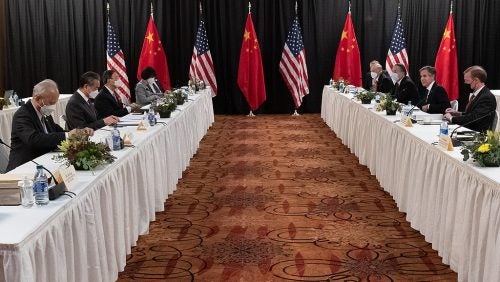New Commerce Department Rule Offers Opportunity for U.S. China Policy
March 30, 2021 by Digital Editor

Secretary of State Antony J. Blinken and National Security Advisor Jake Sullivan meet with Chinese Communist Party Director of the Office of the Central Commission for Foreign Affairs Yang Jiechi and State Councilor Wang Yi, in Anchorage, Alaska, on March 18, 2021.
By Austin Lowe
The next era of U.S.-China relations will be defined in the legal and regulatory realms. The Trump administration’s reliance on decades-old legislation to pursue a number of trade policy actions against China ushered in newfound attention to the U.S. legal and regulatory toolkit across the business, legal, and foreign policy communities. Much of this stemmed from Trump’s penchant for unilateralism and renewed focus on protectionist economic measures that had diminished in relevance as U.S. businesses reaped the benefits of free trade regimes worldwide. Beyond this, however, the Trump administration’s willingness to take a harder line on China’s economic practices provided an opportunity to reassess how such tools can be improved to address new challenges.
There is now, at least in part, a bipartisan recognition that the use of blunt instruments such as the Section 301 tariffs on Chinese goods can generate needed change and precipitate meaningful economic and foreign policy outcomes in furtherance of U.S. interests. At the same time, twentieth-century legislation cannot account for the twenty-first century challenges that are characteristic of U.S.-China economic competition. As a result, the United States is seeking to add new regulatory tools that can better address such complex issues, which often involve new and emerging technologies.
As one of the last acts of the Trump administration, the Department of Commerce published an interim final rule that authorizes the Secretary to prohibit a new category of information and communications technology transactions. More specifically, the focus of this rule is on transactions involving technology or services that have been “designed, developed, manufactured, or supplied, by persons owned by, controlled by, or subject to the jurisdiction or direction of a foreign adversary”—including China, Cuba, Iran, North Korea, Russia, and Venezuela—and pose an “undue or unacceptable risk” to the national security, foreign policy, and economy of the United States. The rule came into effect on March 22 with the apparent endorsement of the new Biden administration.
Unlike the Committee on Foreign Investment in the United States, an interagency group that reviews transactions involving foreign investment in U.S. companies or operations and thus serves more of an export control function, the new authority granted to Commerce and ensuing review process appear to constitute more of an import controlmeasure that will prevent the technology of foreign adversaries from gaining access to the U.S. market. In the context of the Trump administration’s approach to combating China’s economic practices, the promulgation of this rule seems to build on concerns surrounding the surveillance and data collection abilities of Chinese software platforms such as TikTok and WeChat or espionage by Chinese telecommunications company Huawei.
Huawei has already faced much scrutiny from Commerce on the export control side in terms of its placement on the Entity List, which creates license requirements to export specified items to the named entities. U.S. government employees and federal contractors are also already banned from using Huawei equipment and services. The rule may thus be more immediately relevant to China-owned software companies like TikTok and WeChat. The companies faced potential bans following two executive orders issued by the Trump administration last August, both of which ultimately ended up being temporarily blocked through injunctions in U.S. federal courts.
TikTok and WeChat each carry unique considerations in terms of their current operations in the U.S. market. The Trump administration’s blanket ban on WeChat, for example, posed more serious issues for the Chinese diaspora and their descendants, who use the so-called ‘super app’ to communicate with friends and relatives back in mainland China—where most U.S. social media platforms are banned. TikTok is extremely popular with Gen Z and its greater penetration among U.S. persons, along with the concern that it might share data on such persons with the Chinese government or censor content criticizing it, perhaps warrants more scrutiny.
The interim final rule will offer the Biden administration a chance to pursue a more nuanced policy with respect to the economic and national security threats that China-owned technology firms can potentially pose. The potential to further adjust the rule and the discretion that the new administration will have in its application provides an opportunity to use it as one of many new tools in a more forward-looking, calibrated China policy—one that recognizes the threats posed by the Chinese government but does not undermine healthy competition at home or, worse, treat anything associated with China as posing a national security risk.
Austin Lowe is a 2L student and co-president of the Global Law Scholars Class of 2022. He is the incoming Trade Editor for the Georgetown Journal of International Law and also serves as a research assistant to Professor Yvonne Tew. He previously worked at the DC-based strategic advisory firm The Asia Group and often writes on issues related to trade, national security, and China’s reform trajectory.

